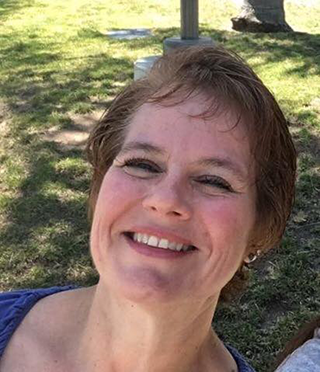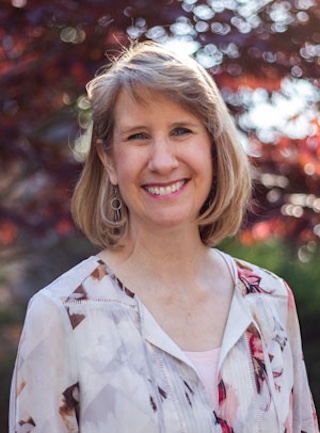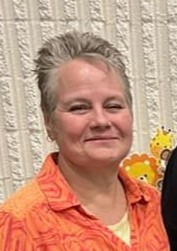-
Men and Women Who Followed in Jesus' Footsteps
 Written by Ana Teresa Vivas, volunteer for Iron Rose Sister Ministries in Canada
Written by Ana Teresa Vivas, volunteer for Iron Rose Sister Ministries in CanadaAt the risk of emphasizing the obvious, I'm going to repeat the title of this blog post: "Men and Women Who Followed in Jesus' Footsteps" and emphasize the highlighted phrase because I want to focus on it.
In the gospels, we can learn the names of the apostles— the twelve closest followers of Jesus. Additionally, we can learn something of their lives and their example as imitators of Him. But there were also other men and women who followed Jesus, if not so closely or from the beginning of His ministry, but still with the same great love and commitment to Him and His work.
We cannot identify them all specifically because there were multitudes who followed Jesus, although many also abandoned Him (Jn 6:66), but we will not talk about these today.
Let's look at this short list:
Luke 19:1-9, Zacchaeus
John 4:46-53, King's Officer
Mark 15:40-41, Mary Magdalene, Mary, the mother of James the younger and Joseph, and Salome
Matthew 12:15, A crowdSoon afterward Jesus began a tour of the nearby towns and villages, preaching and announcing the Good News about the Kingdom of God. He took his twelve disciples with him, along with some women who had been cured of evil spirits and diseases. Among them were Mary Magdalene, from whom he had cast out seven demons; Joanna, the wife of Chuza, Herod’s business manager; Susanna; and many others who were contributing from their own resources to support Jesus and his disciples. (Lk 8:1-3, NLT)
These are people, just like you and me, who believed in Jesus. We don't know in detail about their lives as disciples. We only know of their encounters with Him, and we can see their examples of commitment.
Look at the example of the women mentioned in Luke 8:1-3. It impresses me to think of myself in the place of one of them and imagine walking after Jesus two centuries ago. No way! I have so many questions for them, such as what it was like being a woman and living within their culture. And what about the issue of female grooming? They were very confident about who to follow and why. That alone explains their investment of energy, time, and money in Jesus and His evangelistic campaign.
With these people, we can identify and "chew on” what a follower of Jesus looks like and how I can represent that in the 21st century.
Someone who follows in the footsteps of Jesus is willing to change their values (Zacchaeus), is not afraid of threats (Joanna, the wife of Herod's steward), and risks their position (the king's official).
There are many more examples of men and women following Jesus in the gospels, and from all of them, if we stop for a few minutes, we can learn something if we look closely— if we get into that "movie" of the life of Jesus.
Who is a follower then? From the examples that we can find in the four books that narrate Jesus' life, we can conclude that these are some of the characteristics of His followers: they are willing to change their lives, to invest their monetary gains in the work of Jesus, to invest energy and time, and to sacrifice comforts. These are some of the ways those early disciples showed their commitment and set an example of how to follow the Lord.
What other ways can you identify that they were fully engaged? What other things did they sacrifice? How do you see yourself as a follower of Jesus?
Add your answers to these questions in the comments or make any other observations based on the topic of this blog post.
I encourage you and me to look to Jesus 24/7, 365 days a year, and get from Him the motivation to be His faithful followers.
-
Mentoring Relationships
Written by Ana Teresa Vivas, volunteer with Iron Rose Sister Ministries in Canada

“That which was from the beginning, which we have heard, whichwe have seen with our eyes, which we have looked at and our hands have touched—this we proclaim concerning the Word of life. The life appeared; we have seen it and testify to it, andwe proclaim to you the eternal life, which was with the Father and has appeared to us.”
(1 John 1:1-2, emphasis added)
When John speaks to the brothers in this way, what he is saying in today’s language is: “I want to talk to you about something I know a lot about, or more so someone I knew well. I know what I’m talking about.” Doesn’t that appear to be what he is saying? And when you know less about a certain topic, well, then you easily accept direction, supervision, and guidance from someone who knows more.
Even though the Bible does not mention the word “mentoring,” its practice can be observed through diverse relationships throughout the Scriptures, from the Old to the New Testament. For this reason, it is so important that we recognize the practice, identify the aspects that relate to use and live them out, as part of our identity as Christians, actually our identity as people when you get down to it. And, did you know? Mentorship is equivalent to discipleship. Someone who disciples is a mentor, even when, at times, they don’t “check all the boxes.”
Mentor: Counselor, guide, teacher.
As I mentioned before, there are various examples in the Bible of mentoring relationships; but let’s look at Jesus’ example. Jesus chose 12 men to whom He delegated the task of replicating what He did with them. He taught them something He knew extremely well, the Kingdom. He encouraged and equipped them to complete a mission. He was patient and He loved them. He was their friend and He served them, knowing Who He was and where He was going (John 13:1).
A mentor like Jesus knows who He is, is surrounded by friends, disciples, who are dedicated to His purpose, with perseverance. Just as Paul did and entrusted to Timothy in 1 Timothy 2:2, “And the things you have heard me say in the presence of many witnesses entrust to reliable people who will also be qualified to teach others.”
A mentor is an instrument of God.
“I came to do my Father’s will,” Jesus said in John 6:38.
“One of those days Jesus went out to a mountainside to pray, and spent the night praying to God. When morning came, he called his disciples to him and chose twelve of them, whom he also designated apostles…” (Luke 6:12-13)
A mentor has clear goals in mind and works toward them, guiding his/her disciples there.
“Come, follow me,” Jesus said, “and I will send you out to fish for people.” (Matt. 4:19)
If we are imitators of Jesus, and since we have the Great Commission in Matthew 28:18-20, we also need to and should want to be in mentoring or discipleship relationships. We are also called to be part of this pattern of teaching and growth that we see in the New Testament.
There is no addendum to the Bible where the characteristics of a mentor are listed, but Jesus showed us how to do it: Get close to one or more people that need to be instructed and learn about the Kingdom. Teach them, treat them with love, develop a friendship with them, and persevere toward the goal of walking with Jesus at all times and encourage others to persevere in that walk. That was the key to the spreading of the gospel in the ancient world: The mentoring relationship that Jesus had with His disciples.
I know that it looks simplistic to mention only these few aspects, but these are at the heart of this service, central to our mission (Matt. 28:18-20).
In the same way as the apostle John, we also have seen and “touched” Jesus. We know Him adequately enough to speak to the world about Him. It is our mission to do so.
-
Mentorship Story
 Written byKarol Diogo, volunteer with Iron Rose Sister Ministries in Rio Grande do Sul, Brazil
Written byKarol Diogo, volunteer with Iron Rose Sister Ministries in Rio Grande do Sul, Brazil Caring for people is one of the main examples Jesus left us as a way to continue His work, if not the main one: raising up men and women according to His biblical principles.
Paul mentored many people, but it was with Timothy that this work stood out most clearly. The image of a mentor shines through in 1 and 2 Timothy, especially at the beginning of 2 Timothy. There is great richness in mentoring.
I've been mentored by a sister in the Church of Christ for four years. Allowing myself to be mentored by her has been an incredible turning point in my life and my spiritual life. I believe we should all go through this experience. I see this all throughout the Bible. Jesus did this with the apostles for three years, teaching them both theory and practice, just as the apostle Paul did with Timothy, and it produced great results.
We can see these examples in 2 Timothy 2:1-2 and 2 Timothy 3:10-17. If we follow these examples that Paul left us, we will be following Christ's examples for our Christian life.
May we be GIVERS in our Christian walk (people who help others altruistically, prioritizing the well-being of others, even if it means personal cost). May we interact with each other based on the teachings of God's Word in our interpersonal relationships. In Ephesians 4:12-16, Paul speaks of the purpose of the church being built up is that all may attain unity in the faith and the knowledge of Christ. He further explains in 1 Corinthians 10:24, "No one should seek their own good, but the good of others”(NIV).
Establishing an intentional relationship with God, setting aside time regularly to be alone with Him, is our first priority. If I am faithful to God, I will be faithful to everything He asks (1Co 4:2).Keeping the Word alive within us so we can pass it on to others is a basic Christian principle we cannot forget. This practice is fundamental to the spiritual life, and neglecting it can lead to superficiality and other harm.
God's faithfulness and love offer us security, as Paul teaches us in Romans 8:31. Therefore, if we are faithful to Christ, we will be faithful in everything. This way, we can help others in need of a mentor, just as Paul needed Barnabas, and Timothy needed Paul's guidance. Sister, one day someone will need you—and me too. Therefore, let us be prepared for that moment, mirroring Christ, Paul, Barnabas, and so many others in the Bible who left this teaching.
I learned the importance and responsibility of having a mentor in my life. We know that our greatest mentor should always be Jesus Christ, but a suitable sister in our lives is also important, as we see in Proverbs 11:14.
What I learn, I immediately put into practice. Just as God teaches us, Paul passed his wisdom on to Timothy, and my mentor passes her wisdom on to everyone she teaches. I want to leave these words of encouragement to all: Always be faithful to God, and we will be faithful in everything we do. Never forget the teachings of our Lord and practice them, for poor are those who know but do not practice them.
Seek a Christian mentor, learn their teachings, and put them into practice.This way, you'll become a mentor in the future, helping other sisters. Dedicate yourself to God and to others. People are very important to God, and if they're important to Him, they must be important to us too. John 3:16 reminds us of this. Today, I mentor four sisters, to the honor and glory of our Lord Jesus. Learn, practice, and teach others.
May God always continue to bless us. May His name be glorified and exalted forever and ever. Amen.
-
More Than a Mistake
 Written by Kat Bittner, volunteer with and member of Iron Rose Sister Ministries in Colorado
Written by Kat Bittner, volunteer with and member of Iron Rose Sister Ministries in Colorado“All men make mistakes, but a good man yields when he knows his course is wrong and repairs the evil. The only crime is pride.”
― Sophocles, AntigoneYes. All men – and women – make mistakes. Putting salt in your coffee instead of sugar is a mistake. Going the wrong direction on a one-way street is a mistake. Misspelling a word on a spelling test is a mistake. Bumping into someone with your shopping cart is a mistake. Mistakes are errors in judgment, and no one is immune to them.
The same is true with sin, and even more so because sin is more than a mistake. It is a deliberate and willful choice to do something you know is wrong. “Everyone who sins is breaking God’s law, for all sin is contrary to the law of God” (1 John 3:4 NLT).
Like mistakes, everyone sins (Rom. 3:23). How we properly handle sin is the difference between yielding when we are wrong and pridefully acting contrary to what God wills for our life. The proper response to sin always comes from a humble and contrite heart. And what we learn from our mistakes, even more so from our sins, should cause us to grow in our spiritual journey and draw us closer to God.
One of the most notable biblical examples of learning from our mistakes comes from the story of Jonah. Jonah’s calling by God began with great reluctance. Not only did Jonah not want to do what God expressly told him to do, but he also tried to run away from it. His pride and self-righteous heart deemed the Ninevites less worthy of God’s mercy (Jonah 1:1-3; 4:1-2). Jonah believed that he should not go where God told him to go and do what God told him to do. That was a mistake. Jonah decided that he would instead go somewhere else and do something other than what God commanded. That was sin. Thus, the difference between Jonah’s mistake and Jonah’s sin was the difference between his error in judgment and his willful disobedience. Jonah’s disobedience also caused serious repercussions for others and put innocent men’s lives at risk (Jonah 1:4-15), thereby exacerbating the magnitude of his sin.
Also, Jonah believed he could “flee…from the presence of the Lord” (Jonah 1:3 NKJV) which was a mistake. He judged incorrectly that if he could hide from God or go somewhere other than where God wanted, he could avoid God’s will for him. “’Who can hide in secret places so that I cannot see them?’ declares the Lord. ‘Do not I fill heaven and earth?’ declares the Lord” (Jer. 23:24 NIV). But the pride and disregard in Jonah’s heart was more than a mistake. It was sin! Jonah willfully and arrogantly chose to do something that he knew was wrong. And Jonah was angry about what God wanted him to do because he knew that God was known for being compassionate and merciful as well as vengeful (Ps. 145:8; 94:1).
Despite Jonah’s initial mistake and subsequent sin, he responded humbly with the time God spared his life in the belly of the great fish. Jonah repented and ultimately turned toward what God willed for his life. He learned from his mistake and responded appropriately to his sin.
“In my distress I called to the Lord, and he answered me. I said, ‘I have been banished from your sight; yet I will look again toward your holy temple.’ What I have vowed I will make good. I will say, ‘Salvation comes from the Lord.’”(Jonah 2:1,4,9 NIV)
Jonah’s belief that the Ninevites were beyond redemption was also an error in judgment; it was another mistake. God spared the Ninevites once they repented, and Jonah became angry. He knew that God was “a gracious and compassionate God, slow to anger and abounding in love, a God who relents from sending calamity” (Jonah 4:2b). Jonah’s anger burned even to the point he wished he were dead. That was no mistake. That was sin. Many times, we do the same thing. We mistakenly believe one thing that leads us to err in our judgment. Then we make the wrong choices based on that error, and we become trapped in sin.
All things are lawful for me, but all things are not helpful. All things are lawful for me, but I will not be brought under the power of any.(1 Cor. 6:12, NKJV)
Sisters, we can learn from the story of Jonah. If we are to be women who fear God and want to do His will in our life, we must be humble. Be humble so that we do not err in our judgment. Be humble so that we properly respond to our sin. And be humble to be better learners. As Sophocles stated, we need to be good women who do not yield to a course that is wrong and repair the evil we do. Will you be a woman who learns from her mistake? Better yet, will you be a woman who learns, too, from more than a mistake? Be someone who learns from her sin.
#IronRoseSister #teachthroughrelationships #learnthroughrelationships #learningbymakingmistakes #learnfrommistakes #redemption #Jonah #blog #guestwriter
-
Multiplying Relationships—Partners in the Gospel
Written by Wendy Neill, Advancement Coordinator for Iron Rose Sister Ministries in Arkansas

A 1984 Fabergé shampoo commercial had Heather Locklear say, “I told two friends, and they told two friends, and so on, and so on.” This company understood the power of multiplying relationships. They sought to leverage those relationships to tap into the cheapest and most efficient type of advertising, word-of-mouth advertising, to spread their message.
At Iron Rose Sister Ministries we often refer to, and pray for, “partners in the gospel” (Phil. 1:5). When we find a partner in the gospel, we too leverage this power of multiplying relationships to spread our message: the good news of Jesus Christ.
The book of Acts tells the story of many partners in the gospel. Let’s follow and learn from a few of these relationships.
Barnabas and Paul –Your partner in the gospel can serve as “iron sharpening iron” (Prov. 27:17), helping you grow in your faith. After Paul’s conversion on the road to Damascus (Acts 9), the disciples didn’t know whether to trust him. Barnabas was the one willing to take Paul as his partner in the gospel. He trusted him, helped him mature in his new faith, and presented him to the apostles (Acts 9:27). Later in Acts 11, Barnabas needed help with the growing number of believers in Antioch.
Then Barnabas went to Tarsus to look for Saul, and when he found him, he brought him to Antioch. So for a whole year Barnabas and Saul met with the church and taught great numbers of people. The disciples were called Christians first at Antioch. (Acts 11:25-26 NIV)
In Acts 13, the Holy Spirit Himself called Barnabas and Paul to go on Paul’s first missionary journey. Untold numbers of people heard the good news of Christ because of this relationship.
Paul, Aquila, and Priscilla – Your partner in the gospel may start out as a friend with whom you have something in common. On Paul’s second missionary journey, he went to Corinth (Acts 18) and met a Jew named Aquila and his wife Priscilla. They quickly became friends because they were all tentmakers. He even stayed with them and worked on tents. Soon, this couple became Paul’s partners in the gospel and travelled with him to Ephesus.
Aquila, Priscilla, and Apollos – Partners in the gospel can also be mentoring relationships. While Paul continued his missionary journey, Aquila and Priscilla remained in Ephesus. A Jew named Apollos came to town. He had great enthusiasm as he taught about Jesus but didn’t quite have the whole story. “When Priscilla and Aquila heard him, they invited him to their home and explained to him the way of God more adequately” (Acts 18:26). Notice that Aquila and Priscilla were also partners in the gospel as a married couple and worked together to mentor Apollos. The next verse shows us the power of that multiplying relationship: “When Apollos wanted to go to Achaia, the brothers and sisters encouraged him and wrote to the disciples there to welcome him. When he arrived, he was a great help to those who by grace had believed” (Acts 18:27).
We have followed the multiplying impact of Barnabas to Paul to Aquila & Priscilla to Apollos. The Holy Spirit used these relationships and many others to spread the good news of Jesus Christ like wildfire. I encourage you to scan Acts 13-28 for other partners in the gospel that Paul found on his missionary journeys. It is a long list of people! Then look at Romans 16 to see how many partners he listed living in Rome, including Aquila and Priscilla, “my co-workers in Christ Jesus. They risked their lives for me. Not only I but all the churches of the Gentiles are grateful to them” (Rom. 16:3-4). We don’t know the story of how they risked their lives, but those are loyal partners in the gospel!
Who are your partners in the gospel?Is there someone with a shared interest you could spend more time with? Is there someone who needs mentoring? Is there someone you could ask to mentor you in how to share your faith? It doesn’t matter if you are single like Paul or married like Aquila and Priscilla. You can ask God to send you more partners in the gospel, so the world may know the saving grace of Jesus.
-
My Communication with the Father
Written by Michelle J. Goff, Founder and Director of Iron Rose Sister Ministries

Daily, for about seven years, before, during, and after high school, I faithfully wrote in a prayer journal. I noted which chapters I read from the Old Testament, New Testament, and Proverbs. Since writing is one of the ways in which I process the world, it seemed appropriate that I would spend an allotted time each evening discussing my day with God, my thoughts, my fears, and my questions, in written form.
Most of the time, if I specifically addressed God by name, I would simply say, “Dear God.” I later learned to call on Him as the Great Physician, Comforter, Prince of Peace, Yahweh, Savior, etc. However, during those earlier years of prayer, if I had to pick one primary title that came to mind when I would address God, it was one of Heavenly Father.
“Heavenly” because I saw Him as other-worldly. He was seated up on His throne and would listen to us, inserting an occasional intervention on behalf of a truly worthy request. I would thank Him for His wisdom through the Proverbs and lament the many who did not heed His wisdom.
“Father” was because I emphasized a greater distinction between our Father in Heaven, His Son, Jesus, who came to earth to die on the cross to save us from our sins, and in whose name we pray. Finally, the Holy Spirit was the third title and one to whom I never prayed.
I now thank the Holy Spirit for interpreting my groans (Rom. 8:26) and ask Him to be my Guide, Comforter, and Reminder of Truth (John 14, 16). He is a seal guaranteeing my inheritance!
I have learned to thank Jesus for modeling obedience, for His selfless and sacrificial love, and for choosing what the world would deem unworthy followers to be His initial disciples. He is my Redeemer who ever lives and intercedes for me!
As I continued to address the Father in prayer, the meaning behind that title has evolved. My
relationship and communication with the Father have grown along with my intimacy with Him.
After returning to live in the U.S. after my years in Venezuela, I suffered extreme reverse culture shock. It was not a term that was commonly used at that time, nor was it a phenomenon I was warned about.
Walking through the aisles of the grocery store, I was overwhelmed by the hundreds of choices. I had come from a time and place in which you planned your menu based on whatever you found on the shelf that week, or what you had waited in a long line to obtain.
Navigating new relationships in a culture that felt long-forgotten, I had to explain why I knew nothing of TV shows, movies, commercials, or other “small talk” connection points. I counted down the days to my first visit back to Venezuela and the opportunity to introduce others to the reasons I might’ve been louder or culturally awkward.
A month or two after that return visit to Venezuela, life took another turn and my responsibilities doubled. Still disoriented and uncertain, I clearly remember an opportunity that was granted me to step away for a couple of days. That intentional time of prayer, reflection, Bible reading, and rest was desperately needed.
The most memorable moment from those days was when I pictured myself curled up on God’s lap, crying out my pain to Him. He was a welcoming Father who held my right hand, gently stroking my hair, as He comforted me. I was warmed by His embrace and drawn into a deeper level of trust. He could handle my grief. He could reorient my cross-cultural awkwardness. He could shoulder the weight of my added responsibilities. He would remain faithful and present. Always.
Beautifully, I knew that I could crawl back up into His lap at any time, which I did.
As my Father who loved me deeply, I could go to Him unencumbered by my hesitancy. As my Father who delighted in me, I could bound into His lap to prattle on about my greatest joys. As my Father who called me His daughter, I could hear Him whisper my name as the One who has always known me.
After that first time of picturing myself sitting in God’s lap and sloppily blubbering my heart’s deepest hurts, He truly became my Father.
If you have not been able to communicate with our Father to that level of intimacy, I invite you to start with simply entering His throne room and accepting His invitation to that depth of relationship with Him. It all starts with communication. You don’t have to know what to say. God knows your heart and doesn’t need you to speak a word.
-
My Imperfect Testimony of Transformation in Christ
 Written byAmy Mathis, Iron Rose Sister Ministries Volunteer In New Mexico
Written byAmy Mathis, Iron Rose Sister Ministries Volunteer In New Mexico Do not be conformed to this world, but be transformed by the renewal of your mind, that by testing you may discern what is the will of God, what is good and acceptable and perfect. (Ro 12:2 ESV)
I guess you could say I have had two transformations. The first one happened in March 2024, when I was “re-baptized” [story/explanation in a previous blog post]. After that, I thought I was doing well. I went beyond my comfort zone. I became more involved at church by organizing and leading two ladies’ Bible studies and speaking twice at both the fall and spring "Higher Ground" retreats. I even stepped up in more of a leadership role at work.
All that changed in June of 2024. At that time, I had a mental health break due to issues within my family. I attempted twice to get inpatient treatment at my local hospital, but due to factors beyond my control, I was unsuccessful. After that I chose outpatient treatment and found that God’s Word was true.
Therefore, confess your sins to one another and pray for one another that you may be healed. The prayer of a righteous person has great powers as it is working. (Jas 5:16, ESV)
Thankfully, after seeing some providers that didn't fit, I was able to find a Christian therapist and started a therapy called EMDR [Eye Movement Desensitization and Reprocessing]. Since August of 2024, I have made progress, but I am still working toward my goals.
And we all, with unveiled face, beholding the glory of the Lord, are being transformed into the same image from one degree of glory to another. For this comes from the Lord who is the Spirit. (2Co 3:18)
Because of this progress, I am finding the courage to finally get my driver's license when we move to Texas! I can now think of memories about my mother, without dwelling on the bad memories and, instead, remember the good times we had. I am reminding myself of the truth that my miscarriage was not my fault, as I had been thinking before.
So, I guess you can say that I am working on my second transformation and with my Lord and Savior's help, I can add to my imperfect testimony in Christ!
I have been crucified with Christ. It is no longer I who live, but Christ who lives in me. And the life I now live in the flesh I live by faith in the Son of God, who loved me and gave himself for me. (Gal 2:20)
From Michelle J. Goff: Amy, thank you for bravely sharing your ongoing testimony of transformation! Thank you for sharing the truths In Scripture that have been significant for you in this process. And thank you for letting Christ be the author of your transformation.
Dearest reader of our blog: If you struggle with some of the similar lies and challenging issues within your family, I want to recommend one of our most popular books recently: Who Has the Last Word? Cutting through Satan's Lies with the Truth of God's Word. You will be guided to recognize the lie, replace the lie with truth, and remember the truth through a specific Bible verse. Let's join together In our Imperfect testimonies of transformation in Christ.
-
My Personal Spiritual Thermometer
 Written by Marbella Parra, volunteer with Iron Rose Sister Ministries in Honduras
Written by Marbella Parra, volunteer with Iron Rose Sister Ministries in HondurasIn my Christian life, I have gone through different stages. There have been times when I have felt that I was doing things for God, but I didn't really feel close to Him. More than once, I have wondered how I can diagnose and evaluate my spiritual life. Have you ever felt the same way or asked yourself the same question? What method can we use to evaluate our spiritual life and our relationship with God? In this blog article, we will analyze the teachings of the apostle Paul in Galatians 5 and Romans 8 to define what spirituality is and learn how to create our own thermometer to analyze our relationship with God.
When we talk about spirituality, we tend to confuse some aspects. Many times, we qualify as spiritual, someone who practices spiritual disciplines, that is, someone who prays, meditates on the Scriptures, and attends services, among other things. However, while spiritual disciplines lead us to spirituality, they are not the definitive sign that we are truly spiritual. As we read Romans 8 and Galatians 5, we note that the apostle Paul describes a spiritual person as one who is led by the Holy Spirit to produce His fruit (e.g. love, joy, peace, patience, kindness, goodness, faith, gentleness and self-control in Gal 5:22-23). In this sense, being spiritual is not so much about a set of activities we perform but about a state: a level of connection with God. At this level of relationship with God, the Holy Spirit greatly influences us, enabling us to have attitudes that reflect Christ's character and abandon carnal attitudes.
Unfortunately, many of us have reversed the formula. We believe that through great willpower we must reach a level of perfection that allows us to be worthy of God. However, the good news is that even though we are unworthy, through Jesus' sacrifice, we have the opportunity to be forgiven and receive the Holy Spirit. In the letter to the Romans, the apostle Paul states that we are adopted as children of God and receive the Spirit by which we can call Him "Daddy." What a powerful and consoling message! This means that if we want to develop the character of Christ, the only way to do so is to seek God with a humbled heart and entrust ourselves to the guidance of the Holy Spirit. The formula is that the more we seek Him and humble ourselves before Him, the closer we are to God, and we are transformed and empowered by His Holy Spirit.
We can then say that a heart that is close to God is one that humbles itself before Him and rests in the grace received through Jesus. The result of this is a person who is in a process of sanctification through the guidance of the Holy Spirit to live in the image of Christ. With this in mind, our actions are a sign of our nearness or distance from God. If a person is close to God, he will reflect Him through the fruit of the Spirit, but also, a person who is far from Him will reflect Him through the fruit of the flesh. In short, my sinful actions are the symptoms of drifting away from God, and my good deeds are the symptoms of becoming close to Him.
From this, we can create a personal spiritual thermometer that helps us identify in ourselves how close or far we are from God. A thermometer needs a positive measurement scale, so for this part, we will use the fruit of the Holy Spirit as a reference. We also need a negative measurement scale for which we will use the fruit of the flesh. Our diagnostic process (which should be daily) involves evaluating our attitudes, thoughts, and words throughout the day and seeing in which direction they move. Are my actions, thoughts, and words a reflection of the fruit of the Holy Spirit? If the answer is no, this is a symptom that our heart is not close to God. At those times, let’s set aside time to seek His presence, repent, and ask for His guidance and the control of His Holy Spirit. If the answer is yes, let us give glory to God because we know that the good that is in us does not come from our effort, but from the work of the Holy Spirit in our lives, so we must continue to seek Him daily to continue to be perfected in Him.
Would you be willing to use this spiritual thermometer every day? Do you think it would help you grow in your commitment to God?
-
Not Perfect, but Seeking God's Heart
 Written by Deanna Brooks, volunteer with Iron Rose Sister Ministries in Arkansas
Written by Deanna Brooks, volunteer with Iron Rose Sister Ministries in ArkansasBe perfect. Be holy. These words ring in my ears over and over… and I hurt, because I know my weak spots. Can you identify? Have you had those feelings?
First Peter 1:15-16 tells us: “…as he who called you is holy, you also be holy in all your conduct, since it is written, ‘You shall be holy, for I am holy’” (ESV).
The Savior said, “You therefore must be perfect, as your heavenly Father is perfect” (Mt 5:48).
I see these commands as the path our lives should take so we better understand our Heavenly Father's desire for us to follow Him. We sin… none of us are righteous (Ro 3:10), but when we obey Jesus and are baptized for the remission of sins, His righteousness covers us (2Co 5:21; Php 3:9; Gal 3:27; Eph 4:24).
God told Samuel that He looks on the heart (1Sa 16:7).
At Antioch, Paul told those present that David was a man after God’s own heart (Ac 13:22).
When I read this, I think of David as a man who wanted more than anything to do God’s will, despite the battles he sometimes had with Satan… and David, like we do, sometimes lost those battles with Satan.
A verse that is special to me is Psalm 25:7, where David writes: “Remember not the sins of my youth.” All of us understand that as we grow in our relationship with God, we realize we made some poor decisions in our earlier lives that we would not make now simply because of the experience we have in life. We have to learn how to deal with peer pressure, to learn to control desires when something looks good but is wrong, and sometimes by simply learning it is ok, and right, to say “no.”
In Psalm 51 David cries out for God to “create within [him] a clean heart.” The Hebrew word David used for “create” is the same word in Genesis 1:1… something only God can do.
What do you think God looks for in a heart that seeks Him? I think of the following:
1. God wants my heart to love Him. “…Love the LORD your God with all your heart and with all your soul” (Dt 30:6b). ”…Love the Lord your God with all your heart and with all your soul and with all your mind” (Mt 22:37b).
2. God wants my heart to put Him first. “You shall have no other gods before me” (Ex 20:3).
3. God wants my heart to serve Him. “…serve him with all your heart and with all your soul” (Dt 11:13b).
4. God wants my heart to keep His Word. “This day the LORD your God commands you to do these statutes and rules. You shall therefore be careful to do them with all your heart and with all your soul” (Dt 26:16).
5. God wants my heart to seek Him. “And they entered into a covenant to seek the LORD, the God of their fathers, with all their heart and with all their soul” (2Ch 15:12). “You will seek me and find me, when you seek me with all your heart” (Jer 29:13).
6. God wants my heart to follow Him. “…My servant David, who kept my commandments and followed me with all his heart, doing only that which was right in my eyes” (1Ki 14:8b).
7. God wants my heart to praise Him. “I will glorify your name forever” (Ps 86:12b).
8. God wants my heart to trust Him. "For our heart is glad in Him, because we trust in His holy name” (Ps 33:21). “In God whose word I praise, in God I trust; I will not be afraid. What can flesh do to me?” (Ps 56:4).
9. God wants my heart to have unwavering faith in Him. “I am the resurrection and the life. Whoever believes in me, though he die, yet shall he live, and everyone who lives and believes in me shall never die” (Jn 11:25, 26).I believe God said of David: “I have found a man who cares about the things I care about.”
I need to ask: What am I doing in my life to make sure the things important to me are the same things that are important to my Heavenly Father?
-
One Way or Another, He’s Gonna Getchya, Getchya, Getchya
 Written by Rianna Elmshaeuser, volunteer with Iron Rose Sister Ministries in Colorado
Written by Rianna Elmshaeuser, volunteer with Iron Rose Sister Ministries in ColoradoOne of the most comforting memes I’ve ever seen says, “When God put a calling on your life, he already factored in your stupidity.” When God calls us to something, it can be exciting and terrifying all at once. Feelings of “I want this but I have no idea what I’m doing,” and ”What if I mess it up and souls are lost because I was mistaken about my calling” race through our minds. To put my favorite meme another way, God knows everything about you; good and bad, your level of competence, the family you’re from, the church you attend, your deepest fears and failings, the questionable and sometimes destructive patterns in your life. He looked at all of that and He said, “You. I pick you.”
When God called Isaiah in Isaiah 6, the prophet was distressed because he wasn’t perfect and had sinned. After pointing this out to God, Isaiah was cleansed of his guilt and sins. God called again and Isaiah said, “Here am I. Send me!” (Isa 6:8b NIV). If we have obeyed the gospel and are followers of Christ, we are in the same position as Isaiah. I know people like Isaiah who have something put on their hearts by God and are able to seize the opportunity placed before them without hesitation. God says, “Jump,” and they say, “How high?”
I wish this were the case for me, but it is not. On the spectrum of taking a leap of faith, I fall a lot closer to Moses than I do Isaiah. Let’s look at Moses’ calling by God which started with a miracle and goes on for two chapters. After witnessing the miracle of an ever-burning bush, Moses is told to go to the elders of Israel and convince them, who already believe in God, to go to the king. God tells Moses exactly what he should say and what God will do to convince Pharoah to let the Israelites go. I want to pause and just note that, wouldn’t that be great? Not only would you have a whole crowd of people with you to confront the most powerful king in the world at the time, but God says, “Here is the game plan and how the future will play out.”
Moses argues and argues even after more miracles are performed for him until God gets angry. He is being told to speak again and again and again by Almighty God of whom he has the good sense to be very afraid and he still asks Him to send someone else. But in Exodus 4:14, we see that God already knew that Moses, in addition to being the meekest man that ever lived, had an unmatched and unrivaled fear of public speaking for all of time.
Then the Lord’s anger burned against Moses and he said, ‘What about your brother, Aaron the Levite? I know he can speak well. He is already on his way to meet you, and he will be glad to see you’”. (Ex 4:14)
God wanted Moses to trust Him, but He knew how hard that would be, so He called Moses’ brother out to the wilderness before His conversation with Moses.
It is easy to look at Moses’ story and shake my head in awe at his stubbornness. But then when I look at my own life, I know that I need constant reassurance from God in my calling. God is patient and faithful and always provides it, but when will I push Him too far? Take a look at your own life. Is there something that you feel pushed to do but have found reason after reason after reason not to do it? God has demonstrated and documented His ultimate power for all of us yet somehow we manage to believe that He cannot overcome our individual personality flaws.
I recently started my Master’s program to become a counselor and on the first day of class, the professor asked everyone why they chose Denver Seminary. The stories everyone told were fascinating. There were people from Asia, the Caribbean, Central America, South America, and all over the United States. Each person had a unique story. Some were not sure exactly how they wound up at this school. Some had dreamed of coming there. There was one person who had desperately tried to leave the area to get away from home but wound up five minutes from her house.
What I am taking away from the stories shared and from Isaiah and Moses is that when God puts a calling on your life, trust Him. He knows what He’s doing, and He picked you for a reason.
-
Our Big Event: Three Events in One!
 By Wendy Neill, IRSM’s Partners Ambassador
By Wendy Neill, IRSM’s Partners Ambassador When we live our lives as wise women following our Savior, we will be invited to the biggest and greatest event in all of history: the Second Coming of Christ. I love to visualize that day. I think of it as three events in one:
- The Ultimate Royal Wedding
- The Master’s Feast
- A Victorious Celebration
The Ultimate Royal Wedding
All royal weddings, celebrity weddings, and movie weddings pale in comparison to the wedding we await in heaven. We know the groom is our precious Savior, Jesus Christ. Who is the bride? Your initial response might be “Me!” But let’s look in the Bible to get the bigger picture.
Husbands, love your wives, just as Christ also loved the church and gave Himself for her, that He might sanctify and cleanse her with the washing of water by the word, that He might present her to Himself a glorious church, not having spot or wrinkle or any such thing, but that she should be holy and without blemish.(Eph 5:25-27 NKJV)
Jesus washes His bride, the church, cleansing her of anything impure to “present her to Himself.” In Revelation 19, John tells us our good works are the clean linen that makes up the gown of the bride.
“The wedding of the Lamb has come, and his bride has made herself ready. Fine linen, bright and clean, was given her to wear." (Fine linen stands for the righteous acts of God's holy people.) Then the angel said to me, "Write this: Blessed are those who are invited to the wedding supper of the Lamb!" (Rev 19:7-9 NIV)
I can’t wait to participate in this wedding of the ages and to enjoy the wedding supper of the Lamb.
The Master’s Feast
See what you think of this vivid language in Isaiah regarding the feast God prepares:
On this mountain the LORD Almighty will prepare a feast of rich food for all peoples, a banquet of aged wine—the best of meats and the finest of wines. On this mountain he will destroy the shroud that enfolds all peoples, the sheet that covers all nations; he will swallow up death forever. (Isa 25:6-8)
When I taught this lesson to our ladies’ class, I conspired with our seniors to surprise my class with a heavenly banquet. Some brought homemade treats, some gave me money to buy what I needed, and some came ahead for a few hours and decorated the table with fresh flowers, lovely place settings, and little goblets. With the money, I bought a chocolate fountain and set various fruits and other dippable foods around it. It was an evening to remember. We left a seat at the head of the table for Christ, anticipating feasting with Him in heaven.
A Victorious Celebration
In the United States, we have “March Madness,” a national college basketball tournament. “Underdogs” (teams that haven’t won as many games) often beat the favored teams. In 2021, the college I had attended managed to get into the tournament. Although they were serious underdogs, I still chose them to win out of loyalty. Sure enough, they beat the University of Texas by one point! You can imagine the celebration on that court. Everyone was bouncing like pogo sticks, hugging one another, and exchanging high fives.
As Christians, we sometimes feel like we are the underdogs. Satan appears to be winning. But unlike sports teams, we know that we are going to win, and Satan will lose.
And the devil, who deceived them, was thrown into the lake of burning sulfur, where the beast and the false prophet had been thrown. They will be tormented day and night for ever and ever. (Rev 20:10)
We aren’t the only ones who will celebrate the victory. In Revelation 5:11-14, we see “thousands upon thousands, and ten thousand times ten thousand” angels and every creature in heaven and on earth and under the earth and in the sea singing to our worthy champion: the Lamb. Imagine all those angels and animals singing in a tidal wave of sound that doesn’t hurt your ears but is utterly thrilling.
Are you eagerly anticipating the big event: The Ultimate Royal Wedding, the Master’s Feast, and a Victorious Celebration?
-
Out of Our Mind for Christ
 Written by Wendy Neill, Advancement Coordinator for Iron Rose Sister Ministries
Written by Wendy Neill, Advancement Coordinator for Iron Rose Sister MinistriesHave you ever had someone look at you like you were crazy when you talked about God? I have.
My favorite subject is heaven. My greatest joy is encouraging people to look forward to eating twelve crops of fruit from the tree of life (Rev 22:2,14,19), drinking the water of life (Rev 22:1,17), and worshiping God on His sapphire throne surrounded by a rainbow that resembles an emerald (Eze 1:26-28; Rev 4:2-3). I can understand why some people think that sounds crazy!
Apparently, there were people who thought Paul was not right in the head. In 2 Corinthians 5, he is also excited about heaven! He talks about the new eternal body we will get once this earthly body (our “tent”) is destroyed or taken down (v. 1). He says he would rather be away from the body (in other words, dead), and at home with Christ in heaven (v. 8). Paul knew his words sounded like lunacy to some and like logic to others:
If we are "out of our mind," as some say, it is for God; if we are in our right mind, it is for you. For Christ's love compels us, because we are convinced that one died for all, and therefore all died. And he died for all, that those who live should no longer live for themselves but for him who died for them and was raised again. (2Co 5:13-15 NIV)
He doesn’t care if he appears out of his mind or of sound mind. Christ’s love compels Paul to teach because he is convinced of the good news. If we are fully convinced that Christ died for all of us, we can stop worrying about what people think about our state of mind, and just live for Him.
That’s not easy, is it? We don’t like to look crazy. Even if we share with others what Christ has done, we might focus on the more “logical” aspects, or the inoffensive bits. But even Jesus was accused of being out of His mind (Mk 3:21, Jn 10:20). As His followers, we can expect the same treatment.
Today is a good day to quit being self-conscious and instead, be “out of our minds” for Christ and our future hope.
- Are you willing to appear “out of your mind” for Christ?
- Are you compelled to speak because you are convinced?
Need inspiration? Listen to the song “Crazy People” by Casting Crowns.
-
Passing Down the God Stories
Written by Michelle J. Goff, Founder and Director of Iron Rose Sister Ministries

On the 4th of July (Independence Day), we sat outside at Grandpa and Grandma’s farm, watching the fireworks in the distance and delighting in our annual tradition of root beer floats. Those grandparents are no longer with us, but my nephew and niece have been warned by their mom that they will hear that story every time we enjoy Independence Day fireworks with family, sipping root beer.
On the maternal side of the family, Granddaddy loves to tell jokes. He collected them for years as a speech professor and occasional preacher. As kids, whenever we heard a good joke, we would call him up and retell it. These days, he regales us with his favorites, telling them as if for the first time. When he asks, “Have you heard that one?”, one sister has learned to cleverly respond, “Not today!” The first time he caught on to her joke, he winked, laughed, and said, “Oh, you’re definitely part of this family with that sense of humor!”
Whether time-honored traditions or long-standing jokes, we celebrate the connections they bring. From both sides of my family, another connection is their legacies of faith. I know this because of the stories passed down.
The Iowa grandparents led a quiet life as farmers. The Florida two were teachers in a big city, rampant with worldly influence. Both couples were challenged to live out their faith in their respective contexts. And since we grandkids lived at least an 18-hour car ride from the nearest, we relied more heavily on our parents to pass down the generational stories of faith.
Prayer was a vital lifeline for all four grandparents. Dean and Evelyn prayed that their crops would produce a harvest ample enough to sell and provide for their own needs. They prayed over whether they should take my dad and aunt in as teenagers (as foster parents). They prayed that God would provide preachers for their one-room church building, built by previous generations.
George and Barbara prayed that God would use them to plant seeds of truth and faith in their students. They prayed that God would lead them in starting a nonprofit called Christian Homes for Children in South Florida and use them to bless children who were not able to receive loving care in other places. George even wrote a book, Prayer Power, contributing the proceeds from book sales to that foster care ministry. Even earlier this year, Grandmommy wanted to pray with whichever family member visited her hospital room.
Their “God stories,” as I have endearingly termed them, remind me of God’s faithfulness throughout all generations and have inspired me in how I live out my own faith.
My mom, a gifted storyteller, has created an expectation that we share the God stories. We cannot keep them to ourselves! She never passes up an opportunity to demonstrate how she saw God working, and it doesn’t matter whether the other person is a believer. Her story becomes an intentional invitation to allow Him to author their story.
The beautiful thing is that the more we tell God stories and recognize His hand at work, the more we see Him and invite Him to be the living, active, all-powerful God that He is in our lives.
In a recent conversation, already needing to get back to work, I asked a couple of friends to give me five more minutes to share the full backstory of connections, because only then would the bigger God story of it all be revealed. Neither hesitated in granting my request, anticipating how they would be blessed by hearing it all come together as only God could orchestrate.
The following five minutes cannot be summarized in an 800-word blog post. I would need a map to illustrate what parts of the world I was referring to (five countries on three continents). Hand motions were required to draw connections, from the family where the story began through the interweaving of other families’ lives. We fast-forwarded and rewound our timeline as we navigated the intricacies of the tapestry God was creating. And yes, I showed pictures.
Iron Rose Sister Ministries and hundreds, maybe thousands, of women are reaping the blessing of those interconnected, generational God stories being passed down… and I’m only referring to that morning’s snippets of those families’ entwined God stories (Wyatt, Holland, Goff, Fincher, White, Yarbrough, Brizendine, and Batres).
The best part is that the eternal impact and blessing of the story is not yet fully written. The oldest generation has gone before us, leaving their legacy. It is our responsibility to carry on and pass down their stories of faith.
We may doubt our impact while on this earth. Yet when we share God stories that narrate another person’s faith, we affirm the ripple effect of one life on the legacy of God’s faithfulness.
I cannot wait to hear the God stories to come! Hopefully in heaven, God will gloriously reveal the millions of backstories, faithfully passed down. Oh, to sing those stories with the angels and the thousand generations (Deut. 7:9)!
What God story can you pass down or be a part of today?
-
Perfectly Designed Covenant
Written by Kat Bittner, volunteer with and Board member of Iron Rose Sister Ministries in Colorado

There is a common idiom in English, “marriage made in Heaven,” which implies that a particular marriage is perfect. Yet marriage is never perfect because we are imperfect beings. Marriage was designed by the perfect God, created because God declared, “It is not good that man should be alone; I will make him a helper comparable to him” (Gen. 2:18, NKJV). God Himself brought two humans together, man and woman, in order that they would become one (Gen. 2:22,24). It stands to reason that this God-ordained covenant (a promise between two or more people) should be treated carefully and with respect. God designed marriage to be a covenant between one man and one woman with Him at the head of that union.Consequently, we should be mindful of how we do marriage given the gravity of that covenant. And we could learn from some biblical examples of couples “doing marriage” in and out of God’s design.
Abram and Sarai: God had special plans for Abram. His wife, Sarai, chose to intervene by bringing another woman into their marriage to provide the child that she could not. Having this Egyptian woman, Hagar, bear Abram’s son would prove distressing for all (Gen. 16; 21:8-18). Sarai even grew angry at her husband, laying blame on him for the trouble she caused. “You are responsible for the wrong I am suffering. I put my slave in your arms, and now that she knows she is pregnant, she despises me”(Gen. 16:5, NIV). Sarai would have done well to let God move in their marriage the way He had already planned because God would later fulfill an even greater covenant through Abraham and Sarah’s marriage.
I will make you very fruitful; I will make nations of you, and kings will come from you… I will bless her and will surely give you a son by her. I will bless her so that she will be the mother of nations; kings of peoples will come fromher. (Gen. 17: 6,16)
Joseph and Mary: Even before the actual ceremony, Joseph perceived his marriage covenant with honor and respect. Upon finding out his bride-to-be was pregnant, Joseph chose to break their engagement quietly because he “was a righteous man and did not want to disgrace her publicly” (Matt. 1:19, NLT). He did this even though it was within his authority under the law to publicly condemn Mary. And Mary, a woman highly favored by God, accepted God’s will and His plans for her. I suppose Mary could have chosen another path that did not include Joseph, or just outright rejected God’s desire. However, Joseph and Mary valued the Lord’s design for their marriage and obeyed His will (Luke 1:18-24).
Hosea and Gomer: A union expressly made by God, this marriage was a picture of His love and faithfulness. It was between a prophet and a harlot, used by God in a unique way. Their marriage illustrated the covenant God had with the Israelites not to love any other gods. Hosea and Gomer’s marriage also typified the habitual breaking of that covenant. Gomer wandered unfaithfully from her marriage to Hosea. Hosea repeatedly brought Gomer home only to have her run into the arms of another lover, and God would expect Hosea to go get his wife and bring her home yet again.
Then the Lord said to me, ‘Go and love your wife again, even though she commits adultery with another lover. This will illustrate that the Lord still loves Israel, even though the people have turned to other gods and love to worship them.’ (Hos. 3:1)
Hosea’s and Gomer’s marriage was a living parable that God’s people could see for themselves.
Aquila and Priscilla: Considered a spiritual power couple, Aquila and Priscilla embodied the marriage covenant as God intended. They worked in expanding the church and were instrumental in keeping Paul and his ministry thriving (Rom. 16:3-4). They were church planters (1 Cor. 16:19), spiritual mentors (Acts 18:26), and traveling missionaries (Acts 18:18). All this married couple did for the Lord, they did together. They are an example of how to do marriage covenant as God perfectly designed it.
Marriage will never be perfect because we are imperfect beings. However, we should strive for excellence in marriage because we have the blood of Jesus, the perfect One, to sanctify us and make us holy(Heb. 13:12). Jesus perfects us! He makes us righteous! We need Him to perfect our marriage and make it right.It is an honorable thing to have a “marriage made in Heaven” because the marriage covenant is holy, designed by the perfect God to be at the head of that covenant. How will you honor the marriage covenant?
-
Persevere as a Committed Disciple
 Written by Kara Benson, volunteer with Iron Rose Sister Ministries in Alabama
Written by Kara Benson, volunteer with Iron Rose Sister Ministries in Alabama[Let us fix] our eyes on Jesus, the pioneer and perfecter of faith. For the joy set before him he endured the cross, scorning its shame, and sat down at the right hand of the throne of God. (Heb 12:2 NIV)
What does it mean to persevere? It is to maintain a purpose or to continue in a course of action despite difficulty. The key to perseverance is persistence in the face of challenge. We are called to persevere as committed disciples…
- Despite what other people think, say, or do. “Do not conform to the pattern of this world, but be transformed by the renewing of your mind. Then you will be able to test and approve what God’s will is—his good, pleasing, and perfect will” (Ro 12:2).
- Despite the deceptive draw of sin. “Therefore, since we are surrounded by such a great cloud of witnesses, let us throw off everything that hinders and the sin that so easily entangles, and let us run with perseverance the race marked out for us” (Heb 12:1).
- Despite our past. Consider Acts 9:20-22. Do you think that Paul ever heard negative comments about his former lifestyle of persecuting the Lord’s church? Yet he writes, “Forgetting what is behind and straining toward what is ahead, I press on toward the goal to win the prize for which God has called me heavenward in Christ Jesus” (Php 3:13b-14).
- Despite thorns in the flesh. Paul pleaded with the Lord to remove his physical struggle.
But he said to me, ‘My grace is sufficient for you, for my power is made perfect in weakness.’ Therefore I will boast all the more gladly about my weaknesses, so that Christ’s power may rest on me. That is why, for Christ’s sake, I delight in weaknesses, in insults, in hardships, in persecutions, in difficulties. For when I am weak, then I am strong. (2Co 12:9-10)
Let this be our humble attitude regarding our health issues, current struggles, and burdens we bear. We can learn thankfulness for our trials as we allow them to lead us closer to Christ.
Why do we persevere? We persevere to…
- Finish the race. “Blessed is the one who perseveres under trial because, having stood the test, that person will receive the crown of life that the Lord has promised to those who love him” (Jas 1:12).
- Reap a harvest. “Let us not become weary in doing good, for at the proper time we will reap a harvest if we do not give up” (Gal 6:9).
- Receive the blessings of righteousness, peace, and sharing in God’s holiness. “God disciplines us for our good, in order that we may share in his holiness. No discipline seems pleasant at the time, but painful. Later on, however, it produces a harvest of righteousness and peace for those who have been trained by it” (Heb 12:10b-11).
- Strive for maturity and completeness. “Consider it pure joy, my brothers and sisters, whenever you face trials of many kinds, because you know that the testing of your faith produces perseverance. Let perseverance finish its work so that you may be mature and complete, not lacking anything” (Jas 1:2-4).
- Encounter the power and goodness of God. “As you know, we count as blessed those who have persevered. You have heard of Job’s perseverance and have seen what the Lord finally brought about. The Lord is full of compassion and mercy” (Jas 5:11).
- Experience opportunities to help and comfort others. “Praise be to the God and Father of our Lord Jesus Christ, the Father of compassion and the God of all comfort, who comforts us in all our troubles, so that we can comfort those in any trouble with the comfort we ourselves have received from God” (2Co 1:3-4).
How do we persevere?
We set our sights on Jesus. We meditate on the life of Christ, the teachings of Christ, the sufferings of Christ, the resurrection of Christ, the promises of Christ, and the glory of Christ. We contemplate what it will be like to finally be home with Jesus, at last, eternally in heaven. We eagerly anticipate the return of our beloved Lord, long for that day, and speed its coming (2Pe 3:12). With our words and with our hearts, we say, “Come, Lord Jesus.”
These [trials] have come so that the proven genuineness of your faith—of greater worth than gold, which perishes even though refined by fire—may result in praise, glory and honor when Jesus Christ is revealed. Though you have not seen him, you love him; and even though you do not see him now, you believe in him and are filled with an inexpressible and glorious joy, for you are receiving the end result of your faith, the salvation of your souls. (1Pe 1:7-9)
-
Persevere as a Committed Disciple
 By Wendy Neill, IRSM Advancement Coordinator in Arkansas
By Wendy Neill, IRSM Advancement Coordinator in ArkansasAs you may know, our theme for this year as a ministry is “Committed to Christ, 24/7 in 2024.” This month, we are focused on being Committed Disciples.
James, the brother of Jesus, was a prominent leader among the New Testament churches. He wrote the book of James to early Christians, and he leads off with a pretty shocking statement: “Consider it pure joy, my brothers and sisters, whenever you face trials of many kinds” (Jas 1:2 NIV). Joy is not the emotion I usually feel when I face trials. So why does he say that? Let’s keep reading: “...because you know that the testing of your faith produces perseverance. Let perseverance finish its work so that you may be mature and complete, not lacking anything” (Jas 1:3-4).
Joy comes from knowing that those trials do the important work of producing perseverance, making us mature and complete, so we don’t lack anything. I can get more excited about that.
But what really ramps up my joy is found further down in verse 12: “Blessed is the one who perseveres under trial because, having stood the test, that person will receive the crown of life that the Lord has promised to those who love him” (Jas 1:12). Now I’m with you, James! I can see the process and how I can consider it joy:
Commitment to Christ -> Trials -> Perseverance -> Maturity -> Crown of Life!
In chapter five, James brings up perseverance again: “As you know, we count as blessed those who have persevered. You have heard of Job's perseverance and have seen what the Lord finally brought about. The Lord is full of compassion and mercy” (Jas 5:11). Job went through extreme trials that I hope you never have to face. But James is reminding us: look what God did for Job in the end!
Like James, I am a big believer of keeping the end in mind, especially when it comes to Heaven. When we set our eyes, our minds, and our hearts on the “end game,” it makes it easier to keep putting one foot in front of the other in faith. My favorite verses about perseverance are the “overcomer” verses in Revelation, chapters two and three. Take some time to read those two chapters and look for this pattern: “To him who overcomes, I will give_______.” (NOTE: the NKJV uses “who overcomes,” while other versions use “who is victorious.”)
I’ll whet your appetite by giving you the first one: "To him who overcomes I will give to eat from the tree of life, which is in the midst of the Paradise of God" (Rev 2:7b NKJV). James told us we will receive the crown of life if we persevere, but we learn from John in Revelation that we will also eat from the tree of life in Paradise! I can definitely feel joy when I keep that end in mind! Keep reading those two chapters and you will find more exciting promises for those who overcome.
We all face trials that test our commitment to Christ. Sometimes we must persevere through “big” trials:
- Trusting God through a medical diagnosis that turns our world upside down.
- Holding His hand through the unexpected death of a loved one.
- Bringing Him our doubts about His plans.
Sometimes we persevere through our everyday, “mundane” trials:
- Stopping those hurtful words from escaping our lips during an argument.
- Turning our eyes away from images that corrupt our minds.
- Extending grace and acceptance to the coworker who is hard to be around.
Big or small, God sees your perseverance and will reward you.
Are there “big” trials you are facing right now? What “mundane” trials do you struggle with? Which of the “end game” promises above would help you persevere in your commitment to God?
“Let us not become weary in doing good, for at the proper time we will reap a harvest if we do not give up” (Gal 6:9 NIV).
-
Practice like a Wise Woman
 Written by Michelle J. Goff, Founder and Executive Director of Iron Rose Sister Ministries
Written by Michelle J. Goff, Founder and Executive Director of Iron Rose Sister MinistriesTherefore everyone who hears these words of mine and puts them into practice is like a wise man who built his house on the rock. (Mt 7:24 NIV)
In the conclusion to His Sermon on the Mount, Jesus reminds us of the importance of putting His teaching into practice, learning then practicing as His followers. It’s like building a house on the Rock. Women’s hands, aged with wisdom, and their voices in children’s classes have shaped this refrain into a memorable song with actions, hand motions, and a simple tune. No one wants to build his house on the sand because we know that it came crashing down when “the rain came down and the floods came up.”
Even today, when the storms of our lives threaten to tear us down, we must cling to the words of Christ and build, or rebuild, our lives on the Rock.
Last year as a ministry, we highlighted various ways in which we are called to live “Committed to Christ, 24/7 in 2024.” With the release of the latest small group Bible study book, we affirmed that we are Committed to Listen. Now that we have “heard these words of [His],” we must turn our attention to putting them into practice, like wise women.
James 1:5 promises that if we ask for wisdom, God will provide it. Those with more life experience can testify to the fact that wisdom is acquired over time. We learn from our failures. We grow through the struggles. Everything we face in life—every thought, action, reaction, and words that do or don’t come out of our mouths—everything provides an opportunity for us to put Jesus’ words into practice.
Fulfilling God’s teaching takes practice. I didn’t learn to play the piano or do a cartwheel on a balance beam overnight. Both activities took practice. As a child, I played many wrong notes, and I fell off the beam on more than one occasion. Today, I can still do a cartwheel, but I haven’t attempted it on a balance beam. These days, I can only remember a few very basic songs on the piano. Why? I stopped practicing.
What are examples from the Christian life that require practice?
Practicing implies failure and grace. Learning a language is a challenge. For some people, it is easier to hear the unique sounds, comprehend the grammar, and learn the vocabulary. Yet no matter what your language-learning ability, you must begin by speaking like a child, imperfectly and incorrectly. You will never perfect the language without giving yourself permission to make mistakes and learn from them.
What have you learned from making mistakes as a Christian?
This year, on Tuesdays (only once/week), we will share biblical and personal stories about how we can build our lives on the Rock, put Jesus’ words into practice, and practice as wise women.
We want to encourage you to use these blog posts as guides for small group discussion, in person or virtually. There will be questions for good conversation and, at times, additional Bible verses for further study.
Let’s practice encouraging each other as wise women! In honor of New Year’s, through our social media channels, share a teaching you want to put into practice this year (maybe through a New Year’s resolution or key word for the year). Alternately, share an example of an area that you want to practice with others.
If you are looking for inspiration, I recommend reading the Sermon on the Mount (Mt 5-7) or ordering Committed to Listen as a 40-day devotional that facilitates dedicated listening, thus learning more about what God is guiding you to put into practice (Mt 7:24).
-
Practicing Thanksgiving like David in the Psalms
 Written byDeanna Brooks, Volunteer with Iron Rose Sister Ministries in Arkansas
Written byDeanna Brooks, Volunteer with Iron Rose Sister Ministries in ArkansasThanksgiving…gratitude…appreciation. Most of us were probably taught the importance of thanking someone when they did something for us.
In the United States, we have a day in November that we call Thanksgiving. Families and friends often gather to share a meal. They may watch the Macy’s Thanksgiving Day Parade and often a football game. But I wonder how much time is spent in actually being thankful… not just for our physical blessings, but for a God who loves us deeply.
In Ephesians 5:20, the apostle Paul encourages us with these words: “…giving thanks always and for everything to God the Father in the name of our Lord Jesus Christ”(ESV).
“Giving thanks always” …do we do that?
David, a man after God’s own heart, penned many psalms of thanksgiving. What makes David’s words so special to me is that he had a lot of struggles: he had to run and hide from King Saul for about 10 years… his sin with Bathsheba… constant battles against Israel’s enemies… and discord within his own house among his children.
Still, he had a heart of thankfulness.
1 Chronicles 16:8-36 is a song of David when the ark was returned to Jerusalem after being taken by the Philistines. In verses 8 and 9, we see David bursting out in thankfulness and praise: “Oh give thanks to the LORD; call upon his name; make known his deeds among the peoples! Sing to him, sing praises to him; tell of all his wondrous works!”
Throughout the book of Psalms, there are many expressions of thanksgiving written by David.
Psalm 100 is the one many people think of first: “Enter his gates with thanksgiving, and his courts with praise! Give thanks to him; bless his name! For the LORD is good; his steadfast love endures forever, and his faithfulness to all generations!” (Verses 4, 5).
In Psalm 111, David begins by saying he will give thanks to the Lord with his whole heart.
Psalm 30 seems to have been written after a near-death experience…perhaps when David was fleeing from King Saul…and he closes verse 12 with these words: “O LORD my God, I will give thanks to you forever!”
Psalm 9 was probably written after a victory over one of Israel’s enemies, and in verse 1, David says, “I will give thanks to the LORD with my whole heart; I will recount all of your wonderful deeds.”
In Psalm 28:7, David acknowledges the Lord as his strength and shield:
The LORD is my strength and my shield; in him my heart trusts, and I am helped;my heart exults, and with my song I give thanks to him. The LORD is the strength of his people; he is the saving refuge of his anointed.”
Psalm 119 shows David’s heart for the Lord as he praises Him with thankfulness:
“Oh how I love your law! It is my meditation all the day” (verse 97).
“How sweet are your words to my taste, sweeter than honey to my mouth” (verse 103).
“Your word is a lamp to my feet and a light to my path” (verse 105).
“Your testimonies are my heritage forever, for they are the joy of my heart” (verse 111).
These are just a few of the writings of David that show why he is called “a man after God’s own heart” (1Sa 13:14, Ac 13:22).
The key to David’s being a man after God’s heart is found in Psalm 119:10: “…with my whole heart I seek you.”
In reading through the Psalms, one thing that stands out to me is that David was continually meditating on God‘s goodness, what God had done, and how God was continuing to both pursue and protect David… not only from his enemies, but from his own sins. David’s response was one of thankfulness.
God continues to pursue us with the same diligence today. In Psalm 23:6, we read, “Surely goodness, and mercy shall follow me.” The Hebrew word for “follow” means an “intense pursuit” … like a lion chasing its prey. God wants to rescue us from the clutches of Satan. Is our response to His pursuit like that of David… a heart seeking Him and filled with thankfulness?
-
Practicing Thanksgiving Through Suffering
 Written byRianna Elmshaeuser, Volunteer with Iron Rose Sister Ministries in Colorado
Written byRianna Elmshaeuser, Volunteer with Iron Rose Sister Ministries in ColoradoI used to have a job for the state of Colorado, where I went to various courthouses in a judicial district and typed out hearings and trials at the highest levels of criminality. I will not go into detail, but I heard the worst of what humans do to one another. I sat in the courtroom with evil regularly. I am a sensitive person, and this job of eight years took an extreme toll on my soul and mental health. When I left that job, I was in bad shape. I would spend my evenings drowning out my thoughts with television, YouTube, or whatever noise I could find. There was no peace in my mind. Many a night, I would weep alone in the dark. I found it difficult to exist in a world where there was such evil.
Today, I am in a much better place. I have a relationship and connection with God and others that I never dreamed possible. I still suffer some of the effects of that job on occasion, which causes a loved one to sometimes comment that they wish I had never had that job. The funny thing is, I do not wish that. In fact, I am grateful for it.
It was that work that forced me to wrestle with deep questions about God and the things He allows to happen. It caused me to focus on the things that matter when it comes to sharing Jesus with people. It opened my eyes to the reality that while we sit in our little churches and bicker about how the communion trays are passed and whether the doors in the back are opened or closed during services, the Enemy is ravaging the world just outside our doors, and much of the time, we are doing nothing about it. That work gave me a passion for those who have no one in their life who has ever shown them true, real love—Jesus’ love.
I left that job in 2019 and went back to school. This past fall, I started the second year of my Master’s in Mental Health Counseling. I have enough experience now (though not much) that I can say with confidence that it is the work God created me to do. I am learning skills to help people heal, learn how to be loved, and find God in suffering. I have done a significant amount of healing myself on this journey. I would never have found any of the beautiful relationships I have today if I had never had that job.
James 1:2-4 says, “Consider it pure joy, my brothers and sisters,whenever you face trials of many kinds, because you know that the testing of your faith produces perseverance. Let perseverance finish its work so that you may be mature and complete, not lacking anything” (NIV).
These verses do NOT mean we must be happy when going through hard seasons and situations. I now know that this means that we should consider it joy because our trials will be productive. When we are enduring unbearable pain and suffering, God is with us in the thick of it, and He is bringing about growth.
My hard times did not end when I left my State job. 2024 was another year of great heartache and loss. But as I endured this season, I knew that from it, God would bring about greater blessings in my heart and my life. I have already begun to see the growth in myself, and I know that more is still to come. While none of us ever wishes for trials of any kind, we can consider them joy when they do come, because we know God is with us, for us, and growing us through the pain.
-
Pray Continuously 24x7
 Written by Marissa Gonzáles, volunteer with Iron Rose Sister Ministries in Guatemala
Written by Marissa Gonzáles, volunteer with Iron Rose Sister Ministries in Guatemala"Pray continually." (1Th 5:17 NIV)
As we read this verse, many of us may ask ourselves, “How can I accomplish this?”
Although some of us learned to pray from our parents or from someone who guided us in our spiritual lives, others did not have that support or teaching—they learned in the process of their growth in faith.
At some point in our lives, we all ask ourselves, “How should I pray? What will be the best way to do it?” Or we worry, “Why is our prayer not as fluid as others?”
Remember, praying is like conversing with someone very close to you to whom you want to tell everything you are going through or your life plans. In it, we find and achieve a close connection, and who better to do this with than our Heavenly Father—remembering that He is the center of everything and that our relationship with Him strengthens our life, faith, and prayers. When you start in prayer, it does not need to be extensive; start small, from your heart, and over time, it will become easier and more fluid.
Remember Jesus saying, "But when you pray, go into your room, close the door and pray to your Father, who is unseen. Then your Father, who sees what is done in secret, will reward you" (Mt 6:6).
Whenever possible, find a place without distractions where you feel comfortable. I know that for moms, grandmothers, or those in charge of a little one, it is not easy to have these spaces. But as soon as you have those little quiet moments, take advantage of them! Give yourself some time for your communication with God, especially if it's at the beginning of the day, and find a place where you feel safe, and where you can connect and know that He hears you. Jesus set the example for us.
"Very early in the morning, while it was still dark, Jesus got up, left the house and went off to a solitary place, where he prayed." (Mk 1:35)
I know it may not be easy to get started, but something that helped me was to make a list of thanksgiving where I could write simple things: thanks for light, cold, heat, etc. Your list may initially be small, but you'll gradually add more. Also, consider in that list what you think are "bad" things; for example, you left home late, the tire of your car or motorcycle was punctured, the transportion you were awaiting was delayed, etc. You'll say, “Be thankful for that?!” Yes, there's something good in everything. What seems bad to you will leave you with a lesson learned, or it will free you from something more unpleasant than just the displeasure of the moment.
Remember the fruit of the Holy Spirit:
But the fruit of the Spirit is love, joy, peace, forbearance, kindness, goodness, faithfulness, gentleness and self-control. Against such things there is no law. Those who belong to Christ Jesus have crucified the flesh with its passions and desires. Since we live by the Spirit, let us keep in step with the Spirit. (Gal 5:22-25)
And remember, praying isn't just about exposing all the needs or difficulties you're going through; it's not even just asking for what you don't have. Rather, it is the means to find peace as you connect with our Father, being grateful for what He allowed you to experience whether it is considered good or bad.
So, start by expressing thanks for every moment... Thank you, God, for this day, thank you for my family, thank you for the coffee, thank you...
Some may say, "How can you give thanks even for coffee?” Yes, we should also be thankful for little things like that because they give us pleasant and comfortable moments! By doing this, we improve our dialogue with God because it will no longer be just about giving thanks; we will also be mindful of why we say thank you. We will understand every situation in our daily lives, and we will be aware that we can change our attitude towards life and others, and that's where our relationship with God will grow.
With this as a foundation, you will form your prayer. Remember that Jesus left us guidance and an example when He prayed to the Father (Mt 6:7-15). Honoring our Heavenly Father, let us humbly present ourselves, ask Him for forgiveness for those faults we have committed, thank Him, express our love and trust in Him, and express what we feel from the heart— total dependency (24x7).
Be thoughtful about your prayers. Which do you do more: asking or being thankful?
Page 7 of 11

